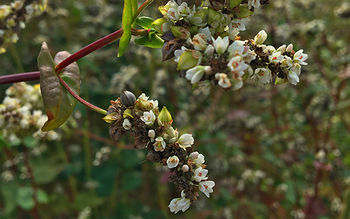Buckwheat
Other Names : Fagopyrum esculentum, common buckwheat, Alforfón, Blé Noir, Buchweizen, Fagopyrum esculentum, Fagopyrum sagittatum, Fagopyrum tataricum, Fagopyrum vulgare, Fagopyri Cymosi, Fagopyrum Cymosi, Grano Turco, Polygonum tataricum, Polygonum convolvulus, Sarrasin, Sarrasin Commun, Silverhull Buckwheat, Trigo Sarraceno, Fagopyrum tataricum, Buchweizen, Sarrasin commun, Boekweit, 蕎麥, कूटू
Buckwheat is the fruit seed of a plant originally from Asia and is known for driving the evil away from homes. It is also very attractive for bees which can produce a special kind of honey, dark colored and strong flavored. In ancient times witches would use buckwheat to draw circles in aid of their rituals. For this reason in Eastern cultures, buckwheat is a symbol of propriety and a defender of it. Buckwheat is part of the Polygonaceae family. Scientifically it is named bitter buckwheat, and is both an aliment and a herb with healing characteristics. Buckwheat contains linoleic acid, vitamins (B1, B2, B3, B5, E, P), essential amino acids, minerals - chromium, copper, manganese, folic acid - and is an excellent source of magnesium. These proprieties recommend buckwheat as having a pronounced Yang feature. It has anti-tumor and tonic effects.
See also : Jin Qiao Mai
Special Precautions of Buckwheat
- Please note, rarely some people are in fact allergic to buckwheat and can have a severe allergic reaction. This is rare, but something you should be aware of as you consider adding this superfood to your regular dietary habits.
- If you need to be gluten-free; when buying buckwheat products like soba noodles do check the label as wheat flour is often added.
- Chinese medicine cautions against buckwheat for individuals with spleen qi deficiency.
- Macrobiotics indicates buckwheat will only do well in the intestines when Candida has been dealt with.
The benefits of Buckwheat are
- improves blood flow by strengthening veins and small blood vessels; to treat varicose veins and poor circulation in the legs.
- Due to the presence of inosit, buckwheat adjusts metabolism, fat and the lipo-soluble vitamins. It also helps the liver in processing hormones, medicines, and glucoses, with a protective hepatic effect.
- Buckwheat provides the necessary amount of proteins necessary for the body because it contains essential amino acids which the body cannot synthesize and who need to be taken from one's daily nutrition.
- Buckwheat decreases the cholesterol level by eliminating fat and assuring protection against arthrosclerosis. It prevents the developing of biliary lithiasis by optimizing the synthesizing of biliary acids and eliminating neutral and acid fat.
- Owing to the quantity of magnesium contained, buckwheat has a relaxing effect over blood vessels, improving circulation and decreasing blood pressure.
- Because it contains plenty of vitamins with B complex, buckwheat is recommended in cases of liver disorders and sugary diabetes, illnesses where it is unadvisable to increase the quantity of sugary substances consumed each day. Due to the fact that it lacks sugary substances makes buckwheat ideal for those who need to keep a restrictive diet.
- This herb offers protection against breast cancer as well as against other forms of cancer dependent on hormones. Through the contained antioxidants buckwheat is an antidote for X ray irradiations or other forms of irradiation.
- Celiac Disease: Because buckwheat contains no gluten, it is much safer for those with Celiac disease to use as a wheat substitute. It should be easier on the digestive tract, unlikely to produce further inflammation.
